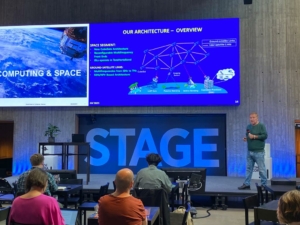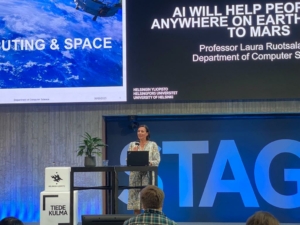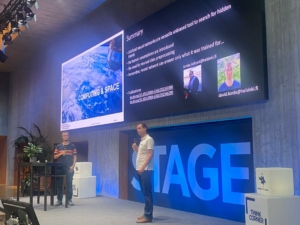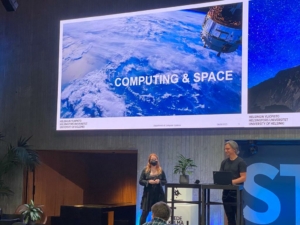University of Helsinki’s (UH) Department of Computer Science organised an event “Computing & Space” at the Think Corner on 6 September 2023. The entire stream can be watched here
Sasu Tarkoma, Dean of the Faculty of Science, opened the event focused on the intersection of computer science and space research. He emphasized the necessity of interdisciplinary collaboration between computer science, physics and other fields of sciences for understanding of the universe. The event featured four keynote presentations: Professor Ian Akyildiz (International Telecommunication Union, ITU), Professor Laura Ruotsalainen (UH), Docent Tomas Kohout (UH) & Dr. David Korda (UH) and Dr. Lucile Turc (UH) (on behalf of Professor Minna Palmroth (UH)) & Professor Teemu Roos (UH).
Small and feasible CubeSats

The first speaker was Georgia Tech Emeritus Professor Ian Akyildiz, who now also affiliated with the University of Helsinki. He has worked in many areas like telecommunications, underwater communication, bio-nanosystems and space communications – the latter being the subject of his presentation. Professor Akyildiz has also collaborated with NASA. More recently, his research has been dedicated to CubeSat technology. CubeSats are small satellites or so-called nanosatellites, weighing between 1 to 10 kilograms, known for their scalability, flexibility, adaptability, cost-effectiveness, and seamless integration capabilities with other existing satellite technologies and drone systems. Notably, similar systems find application in the 6G technology.
Traveling to the Mars with the help of AI

The second speaker was Professor Laura Ruotsalainen from the Department of Computer Science, also affiliated with Finnish Center for Artificial Intelligence (FCAI) and the Helsinki Institute of Sustainability Science (HELSUS). The first part of her presentation focused on space-based measurements to help people to go on Earth everywhere they want and address intentional signal interference issues. The latter portion of her presentation was about her collaborative efforts with NASA in supporting their mission to Mars. Within this project, they are developing AI-based methods for predicting failures in the spacecraft transporting people to Mars. The project is cooperating with Wärtsilä, a company utilising similar sensor technology in their motors and sharing data resources.
Evaluating asteroids by machine learning

Docent Tomas Kohout and Dr. David Korda are researchers in the Department of Geosciences and Geography. Their presentation was focused on their research on employing machine learning techniques to get information about composition of planetary surfaces like asteroids. The presentation started with an overview of the training process for datasets used in assessment. Docent Kohout made a parable for children’s picture books, likening machine teaching to teaching a child to recognize animals. Through these methods it becomes feasible to evaluate asteroid types, their age, composition, and abundance. Such knowledge about asteroid composition contributes to our understanding of the evolution of the whole solar system.
Forecasting space weather

The concluding presentation was delivered by Dr. Lucile Turc and Professor Teemu Roos. Dr. Turc presented on behalf of Professor Minna Palmroth, who regrettably could not participate in the event. Dr. Turc is a member of a team lead by Minna Palmroth, responsible for the development of Vlasiator, a massively parallel simulation of Earth’s magnetic environment. Space weather depends on solar activity and the presence of solar storms. These storms pose risks to astronauts, satellites and spacecraft. Additionally, they have the potential to disrupt terrestrial equipment. Vlasiator helps in comprehending and forecasting space weather, employing applications of machine learning to mitigate its impacts.
Professor Teemu Roos, a distinguished figure within FCAI and the lead instructor of Elements of AI online course, participates in this project. While data processing currently is very slow, forecasting space weather with Vlasiator is still not possible, it nonetheless gives invaluable insights for ongoing research into this phenomenon. Professor Roos is working in refining algorithms to expedite this process, ultimately perhaps enabling the forecasting of events in space.
The audience asked several questions to the presenters. In total, some 75 people attended the event in person or online.